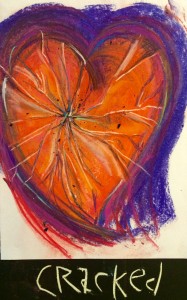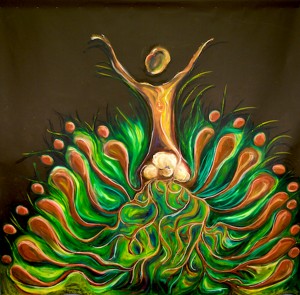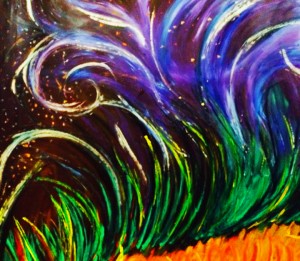God is really only another artist. God invented the giraffe, the elephant, and the cat. God has no real style. God just keeps on trying other things. ~ Pablo Picasso
Our Prayer For Illumination: O God of beauty and delight, make space in our lives to celebrate all that you have made, to enter into the complexity of life, that which is easy and that which is hard, with your voice in our heads and your words inscribed on our hearts, declaring that indeed, it is good, very good. And may we carry your Word into the world until it is made so. Amen.
Our Reading from Genesis 1:1-2:4a (Common English Bible – mostly) We read this as a community, as the story pop-corned around the room, told by more than 30 voices we watched it unfold in images on the screen accompanied by the beauty of the soundtrack from Tree of Life)
community, as the story pop-corned around the room, told by more than 30 voices we watched it unfold in images on the screen accompanied by the beauty of the soundtrack from Tree of Life)
1 When God began to create the heavens and the earth— 2 the earth was without shape or form, it was dark over the deep sea, and God’s wind swept over the waters— 3 God said, “Let there be light.” And so light appeared. 4 God saw how good the light was. God separated the light from the darkness.5 God named the light Day and the darkness Night.
There was evening and there was morning: the first day.
6 God said, “Let there be a dome in the middle of the waters to separate the waters from each other.”7 God made the dome and separated the waters under the dome from the waters above the dome. And it happened in that way. 8 God named the dome Sky.
There was evening and there was morning: the second day.
9 God said, “Let the waters under the sky come together into one place so that the dry land can appear.” And that’s what happened. 10 God named the dry land Earth, and he named the gathered waters Seas. God saw how good it was. 11 God said, “Let the earth grow plant life: plants yielding seeds and fruit trees bearing fruit with seeds inside it, each according to its kind throughout the earth.” And that’s what happened. 12 The earth produced plant life: plants yielding seeds, each according to its kind, and trees bearing fruit with seeds inside it, each according to its kind. God saw how good it was.
13 There was evening and there was morning: the third day.
14 God said, “Let there be lights in the dome of the sky to separate the day from the night. They will mark events, sacred seasons, days, and years. 15 They will be lights in the dome of the sky to shine on the earth.” And that’s what happened. 16 God made the stars and two great lights: the larger light to rule over the day and the smaller light to rule over the night. 17 God put them in the dome of the sky to shine on the earth, 18 to rule over the day and over the night, and to separate the light from the darkness. God saw how good it was.
19 There was evening and there was morning: the fourth day.
20 God said, “Let the waters swarm with living things, and let birds fly above the earth up in the dome of the sky.” 21 God created the great sea animals and all the tiny living things that swarm in the waters, each according to its kind, and all the winged birds, each according to its kind. God saw how good it was.22 Then God blessed them: “Be fertile and multiply and fill the waters in the seas, and let the birds multiply on the earth.”
23 There was evening and there was morning: the fifth day.
24 God said, “Let the earth produce every kind of living thing: livestock, crawling things, and wildlife.” And that’s what happened. 25 God made every kind of wildlife, every kind of livestock, and every kind of creature that crawls on the ground. God saw how good it was. 26 Then God said, “Let us make humanity in our image to resemble us so that they may take charge of the fish of the sea, the birds in the sky, the livestock, all the earth, and all the crawling things on earth.”
27 God created humanity in God’s own image,
in the divine image God created them,[b]
male and female God created them.
28 God blessed them and said to them, “Be fertile and multiply; fill the earth and master it. Take charge of the fish of the sea, the birds in the sky, and everything crawling on the ground.” 29 Then God said, “I now give to you all the plants on the earth that yield seeds and all the trees whose fruit produces its seeds within it. These will be your food. 30 To all wildlife, to all the birds in the sky, and to everything crawling on the ground—to everything that breathes—I give all the green grasses for food.” And that’s what happened. 31 God saw everything he had made: it was supremely good.
There was evening and there was morning: the sixth day.
2 The heavens and the earth and all who live in them were completed. 2 On the sixth [a] day God completed all the work that he had done, and on the seventh day God rested from all the work that he had done. 3 God blessed the seventh day and made it holy, because on it God rested from all the work of creation.[b] 4 This is the account of the heavens and the earth when they were created.
Sermon: Creator God
So today we are marking the beginning of a new season… in my newsletter article last month I described it as a season of experimentation… in that letter I focused on this worship experiment that we are embarking on today, we’re not only going to see what its like to have multiple services, in the coming weeks we will experiment with styles of worship, with music, with what liturgy or preaching means… we are using a new lectionary, called the narrative lectionary that will take us on a journey through the whole arc of the biblical story beginning today with creation… I’m excited about this season but anxious too…
And our experimenting isn’t relegated to the worshiping moment… As part of our ongoing discernment our session is reading a book called Christianity after Religion… the author, Diana Butler Bass, is encouraging communities of Christian faith to enter into a season of exploration, of asking questions about who we are and who God is calling us to be. We are going to be working together to tackle these questions this year. These questions are exciting but also nerve racking when the answers seem hard to grasp – hard to hang onto…
And for many of us, it’s not just here at Friendship that we are marking the changing of a season. We are starting new jobs, new relationships, new schools, gaining independence, moving from childhood to adulthood, or maybe we are becoming more dependent, moving to new homes and saying goodbye to places we’ve long loved and called home. For others, we facing decisions about where to make a home, our healthcare and families, decisions that will shape our lives in the coming months and years… we are facing news, some joy-filled news and some heart-wrenching and we are asking questions – like we do when new phases of life confront us, when seasons change – who am I in this phase of my life? Where is God and where is God calling me? These are good and hard questions…
I wonder if facing a new season, looking deep into the unknown, unsure of what to expect is how God feels when staring out over the face of the deep… breathing that deep breath of wind…
In the beautiful song of creation that we just told together God looks out upon the deep, sometimes described as dark and chaotic, and God speaks light into being… not so much light to expel the darkness – the story doesn’t tell us that it’s evil or out of control, just that it’s messy – one poetic rendition from African American poet, James Weldon Johnson, says,
“And far as the eye of God could see
Darkness covered everything,
Blacker than a hundred midnights
Down in a cypress swamp.
Then God smiled,
And the light broke,
And the darkness rolled up on one side,
And the light stood shining on the other,
And God said: That’s good!”
So God sheds a bit of light on the situation… and that is good – having enough light to pick our way forward into the unknown, but God doesn’t just call the light good – over and over again God keeps surveying the whole of what is coming to life – the darkness and the light – and calls it all good.
Is this how we face the unknown? The deep darkness, the chaos in our own lives?
For some (what I learned growing up) this is the story of God creating order out of the primordial chaos, of God demanding its compliance, bending it to God’s will… exercising God’s power. And there are times this can be a comfort – imagining a God who can control the elements of the natural world, creating boundaries between sky and earth, darkness and light, good and evil… this is a God who can save and protect us.
But it can also make God feel very far away from us, not part of us, but some external force… it can also give us reason to approach our own lives in a similar manner… as something to be subdued and controlled.
And if we divide our world into parts – into two halves: order and chaos, goodness and evil, known and unknown then won’t all of our energy go into drawing a line in the sand and then won’t we spend all of our lives holding that line? Shoring it up, working to keep chaos at bay? Will we ever choose being curious over being comfortable? Can we face the unknown with something besides fear?
I wonder if there is another way to understand this “chaos” from which God draws life in this story.
What if we imagine God’s act of creating as a lavish work of creativity, of curiosity and the chaos teeming with a diversity that will make for a full life? Instead of a demonstration of fierce power, what if the power is in God’s imaginative act of entering into this raw material and coaxing it towards life, shaping it so that it generates and regenerates, what if we understood God’s “order”, not as control, but as a divine balance? God doesn’t do battle in this creation story, God doesn’t win while creation loses, God creates and collaborates…
Listen to the story… God seems to be singing to creation,
“Let the waters swarm with living things…let birds fly above the earth up in the dome of the sky… Let the earth produce every kind of living thing…” (Gen. 1:20-24)
Over and over again God coaxes life forth and invites all of creation to participate in it’s making… it reminds me of a gardener… In the process of planting a garden we plant seeds deep in the soil, and we rely on creation to work with us, to offer itself to the project of birthing new life, the gardeners job is to provide the space for life to take root and flourish… to take on a life of it’s own…
When this Genesis story says God made dome, it means God carved out a great expanse so that life could burst forth, God did not build walls but makes space, and this is the image that we are created in…
God said, “Let us make humanity in our image to resemble us so that they may take charge of the fish of the sea, the birds in the sky, the livestock, all the earth, and all the crawling things on earth.” (Gen. 1:26)
Can we imagine that we resemble God? That God invites us to the act of creating rather than control? This passage… to take charge of the earth, often translated as dominion, has gotten us into a lot of trouble through the centuries as humans have imagined themselves in the image of a God that subdues the world through violence if necessary, as one who forces the earth and it’s creatures to bend to it’s will…
But rather than dominion meaning a repressive or even just a maintaining force… let’s imagine it, for a moment, in the way God demonstrates dominion in the act of creation… by reaching into the depths making the way for life to flourish… we are created in God’s image as the midwife, the gardener, the artist, the lover, the creator…
How do we as humans made in this image of this God face the unknown? How do we survey the deep or approach the chaos of our lives?
Explaining our theme… In her book, Christianity after religion (that I mentioned earlier), Diana Butler Bass says that sometimes we “forget that spiritual journeys are entwined with the Great I AM.”[i] We forget who and whose we are, in part, because we get caught up in the chaos of our lives, of the drama or mundane moments, and it seems that God is something very far away. It’s easy to become overwhelmed by the unknown when it feels as if we are facing it alone.
Diana Butler Bass says that we’ve gotten accustomed to asking the ‘who are we’ question as if we are alone in the world, untethered or disconnected… and it’s an awfully tough question to answer in isolation. She suggests that we push the questions a bit further, remembering that we are grounded in a larger relationship with God; she suggests we ask ourselves two questions:
Who am I in God? And who is God in me?
In the creation story of a God who moves into the world and generates life from the inside out, where do we locate ourselves in this work? Are we insiders or outsiders? Part of the creative process? Co-creators with God? For the Israelites who first told this story it became an anthem of new life beyond Babylonian control, it became a protest of the world-view that kept them in bondage… “While their oppressors saw the origins of the universe as violent and bloody, the Israelites told their children a different story rooted in goodness and blessing. Light came from the deepest night, and order from chaos. The sun and the moon and the stars were set as signs of beauty and the changing of the seasons, providing light and direction and the keeping of time. God filled the earth with vegetation that was fruitful and nourishing, moved the waters back from the land and provided a home for the creatures that crawled across it, walked upon it, and flew over it. In the midst of this loveliness, humankind was tenderly placed, and blessed, and called to be caretakers and stewards of an abundance of gifts.”[ii]
How we orient ourselves to God matters.
- It matters when facing decisions about military action in Syria and how we relate to human beings around the globe.
- It matters when we try to understand the violence in our own city.
- It matters when we are beginning new journey, beginning new work and relationships.
- It matters when we are confronted with chaos, heartbreak or crisis.
- How is God working in me? How am I working in God?
We are going to use these questions through out our worship experiment, reminding ourselves that this isn’t simply an exercise in finding ourselves but finding ourselves in God and discovering how God is moving in us. What if we truly believe that we were made in God’s image, not just imitators of God, but that we live and move in God and that God lives and moves and breathes into us?
This week as you face a new season or settle into a place already well known:
Ask yourself, who am I in God as a creator… a creative force, a generator, life-maker?Imagine God is inviting you to generate new life… where, who, how will you be a force for creativity?
Ask yourself who is God in me as a creator… moving as a creative force, a generator, life-maker? Where might God carve out a place for new life? What are the spaces in your life teeming with the possibility?
Where are the vast depths and the darkness? Instead of facing them with fear, imagine this:
God smiles,
And the light breaks,
And the darkness rolls up on one side,
And the light stands shining on the other,
And God says: This is very good!”
Amen.
[i] Bass, Diana Butler (2012-03-13). Christianity After Religion: The End of Church and the Birth of a New Spiritual Awakening. HarperCollins. Kindle Edition.
[ii] Huey, Kate. Feed Your Spirit, Weekly Seeds at ucc.org
(7673)







 community, as the story pop-corned around the room, told by more than 30 voices we watched it unfold in images on the screen accompanied by the beauty of the soundtrack from Tree of Life)
community, as the story pop-corned around the room, told by more than 30 voices we watched it unfold in images on the screen accompanied by the beauty of the soundtrack from Tree of Life) The author of James is not kidding around, after making several metaphors of how the human tongue sets the course and manages our behaviors he compares the tongue in these verses to a fire. And not just a small campfire, no he’s talking about a wild and uncontrollable forest fire, an all consuming hellish fire…
The author of James is not kidding around, after making several metaphors of how the human tongue sets the course and manages our behaviors he compares the tongue in these verses to a fire. And not just a small campfire, no he’s talking about a wild and uncontrollable forest fire, an all consuming hellish fire…